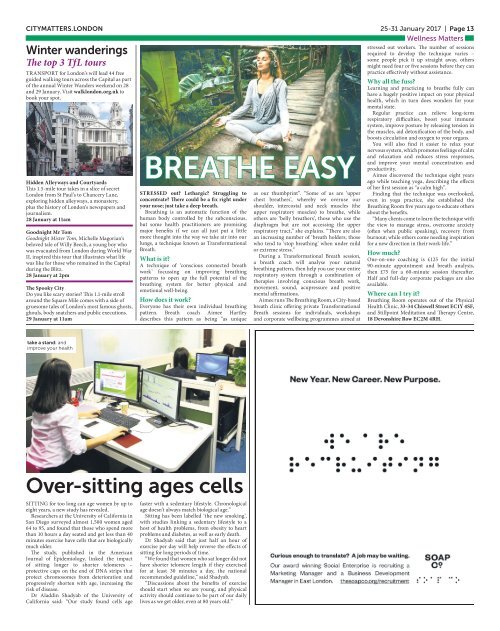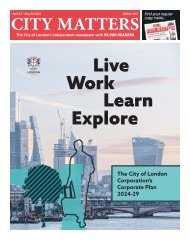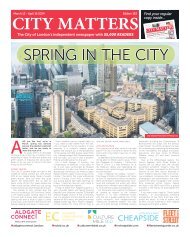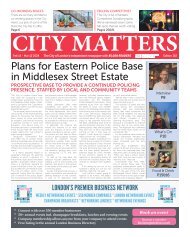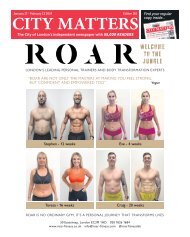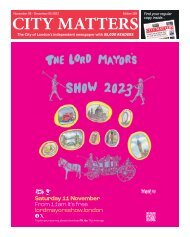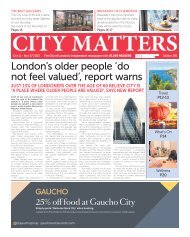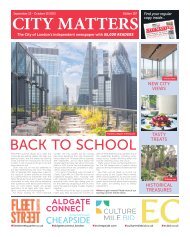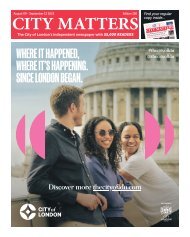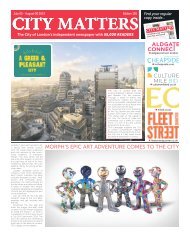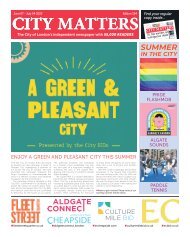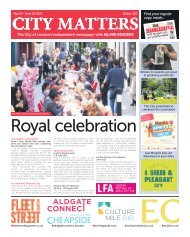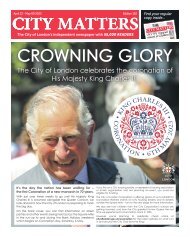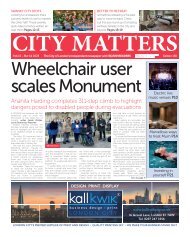City Matters Edition 017
City Matters Edition 017
City Matters Edition 017
Create successful ePaper yourself
Turn your PDF publications into a flip-book with our unique Google optimized e-Paper software.
CITYMATTERS.LONDON 25-31 January 2<strong>017</strong> | Page 13<br />
Wellness <strong>Matters</strong><br />
Winter wanderings<br />
The top 3 TfL tours<br />
TRANSPORT for London’s will lead 44 free<br />
guided walking tours across the Capital as part<br />
of the annual Winter Wanders weekend on 28<br />
and 29 January. Visit walklondon.org.uk to<br />
book your spot.<br />
Hidden Alleyways and Courtyards<br />
This 1.5-mile tour takes in a slice of secret<br />
London from St Paul’s to Chancery Lane,<br />
exploring hidden alleyways, a monastery,<br />
plus the history of London’s newspapers and<br />
journalism.<br />
28 January at 11am<br />
Goodnight Mr Tom<br />
Goodnight Mister Tom, Michelle Magorian’s<br />
beloved tale of Willy Beech, a young boy who<br />
was evacuated from London during World War<br />
II, inspired this tour that illustrates what life<br />
was like for those who remained in the Capital<br />
during the Blitz.<br />
28 January at 2pm<br />
The Spooky <strong>City</strong><br />
Do you like scary stories? This 1.1-mile stroll<br />
around the Square Mile comes with a side of<br />
gruesome tales of London’s most famous ghosts,<br />
ghouls, body snatchers and public executions.<br />
29 January at 11am<br />
BREATHE EASY<br />
STRESSED out? Lethargic? Struggling to<br />
concentrate? There could be a fix right under<br />
your nose; just take a deep breath.<br />
Breathing is an automatic function of the<br />
human body controlled by the subconscious,<br />
but some health practitioners are promising<br />
major benefits if we can all just put a little<br />
more thought into the way we take air into our<br />
lungs, a technique known as Transformational<br />
Breath.<br />
What is it?<br />
A technique of ‘conscious connected breath<br />
work’ focussing on improving breathing<br />
patterns to open up the full potential of the<br />
breathing system for better physical and<br />
emotional well-being.<br />
How does it work?<br />
Everyone has their own individual breathing<br />
pattern. Breath coach Aimee Hartley<br />
describes this pattern as being “as unique<br />
as our thumbprint”. “Some of us are ‘upper<br />
chest breathers’, whereby we overuse our<br />
shoulder, intercostal and neck muscles (the<br />
upper respiratory muscles) to breathe, while<br />
others are ‘belly breathers’, those who use the<br />
diaphragm but are not accessing the upper<br />
respiratory tract,” she explains. “There are also<br />
an increasing number of ‘breath holders; those<br />
who tend to ‘stop breathing’ when under mild<br />
or extreme stress.”<br />
During a Transformational Breath session,<br />
a breath coach will analyse your natural<br />
breathing pattern, then help you use your entire<br />
respiratory system through a combination of<br />
therapies involving conscious breath work,<br />
movement, sound, acupressure and positive<br />
mental affirmations.<br />
Aimee runs The Breathing Room, a <strong>City</strong>-based<br />
breath clinic offering private Transformational<br />
Breath sessions for individuals, workshops<br />
and corporate wellbeing programmes aimed at<br />
stressed out workers. The number of sessions<br />
required to develop the technique varies –<br />
some people pick it up straight away, others<br />
might need four or five sessions before they can<br />
practice effectively without assistance.<br />
Why all the fuss?<br />
Learning and practicing to breathe fully can<br />
have a hugely positive impact on your physical<br />
health, which in turn does wonders for your<br />
mental state.<br />
Regular practice can relieve long-term<br />
respiratory difficulties, boost your immune<br />
system, improve posture by releasing tension in<br />
the muscles, aid detoxification of the body, and<br />
boosts circulation and oxygen to your organs.<br />
You will also find it easier to relax your<br />
nervous system, which promotes feelings of calm<br />
and relaxation and reduces stress responses,<br />
and improve your mental concentration and<br />
productivity.<br />
Aimee discovered the technique eight years<br />
ago while teaching yoga, describing the effects<br />
of her first session as “a calm high”.<br />
Finding that the technique was overlooked,<br />
even in yoga practice, she established the<br />
Breathing Room five years ago to educate others<br />
about the benefits.<br />
“Many clients come to learn the technique with<br />
the view to manage stress, overcome anxiety<br />
(often when public speaking), recovery from<br />
burnout; while others come needing inspiration<br />
for a new direction in their work-life.”<br />
How much?<br />
One-on-one coaching is £125 for the initial<br />
90-minute appointment and breath analysis,<br />
then £75 for a 60-minute session thereafter.<br />
Half and full-day corporate packages are also<br />
available.<br />
Where can I try it?<br />
Breathing Room operates out of the Physical<br />
Health Clinic, 33-34 Chiswell Street EC1Y 4SF,<br />
and Stillpoint Meditation and Therapy Centre,<br />
18 Devonshire Row EC2M 4RH.<br />
take a stand: and<br />
improve your health<br />
Over-sitting ages cells<br />
SITTING for too long can age women by up to<br />
eight years, a new study has revealed.<br />
Researchers at the University of California in<br />
San Diego surveyed almost 1,500 women aged<br />
64 to 95, and found that those who spend more<br />
than 10 hours a day seated and get less than 40<br />
minutes exercise have cells that are biologically<br />
much older.<br />
The study, published in the American<br />
Journal of Epidemiology, linked the impact<br />
of sitting longer to shorter telomeres –<br />
protective caps on the end of DNA strips that<br />
protect chromosomes from deterioration and<br />
progressively shorten with age, increasing the<br />
risk of disease.<br />
Dr Aladdin Shadyab of the University of<br />
California said: “Our study found cells age<br />
faster with a sedentary lifestyle. Chronological<br />
age doesn’t always match biological age.”<br />
Sitting has been labelled ‘the new smoking’,<br />
with studies linking a sedentary lifestyle to a<br />
host of health problems, from obesity to heart<br />
problems and diabetes, as well as early death.<br />
Dr Shadyab said that just half an hour of<br />
exercise per day will help reverse the effects of<br />
sitting for long periods of time.<br />
“We found that women who sat longer did not<br />
have shorter telomere length if they exercised<br />
for at least 30 minutes a day, the national<br />
recommended guideline,” said Shadyab.<br />
“Discussions about the benefits of exercise<br />
should start when we are young, and physical<br />
activity should continue to be part of our daily<br />
lives as we get older, even at 80 years old.”


